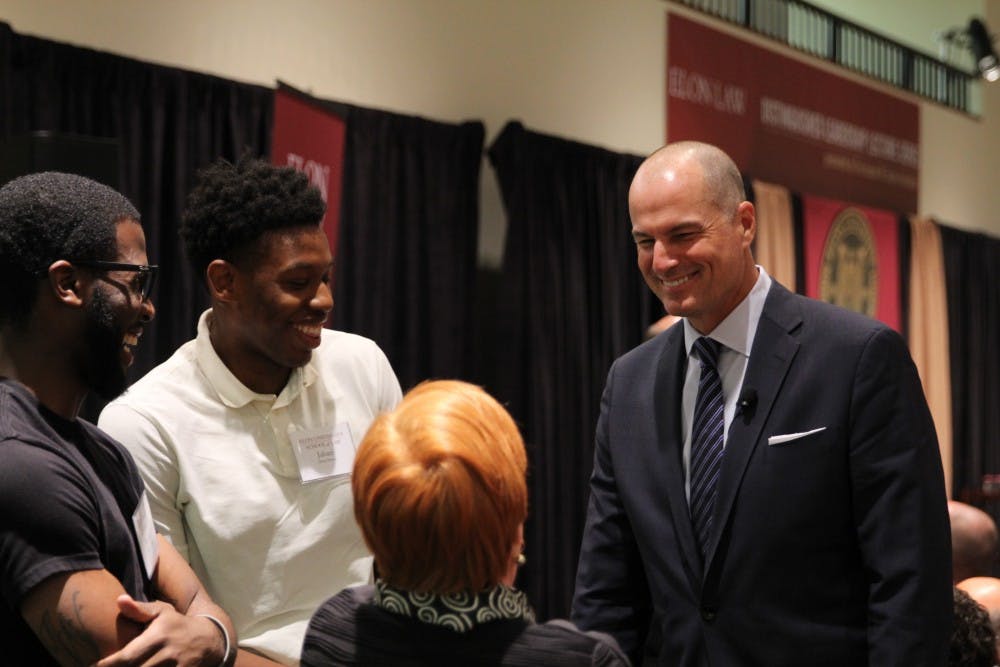Jay Bilas has covered a plethora of nationally televised college basketball games with high-profile teams such as Duke University, the University of North Carolina at Chapel Hill and The University of Kentucky, but the well-renowned sports broadcaster says his first game with a significantly smaller audience was his most important one.
Because he rigorously prepared for an “unappealing” matchup between the University of North Carolina at Greensboro and Charleston Southern University, he accurately predicted the tip-in at the buzzer that led to Charleston Southern’s victory, which led to his promotion at ESPN.
In front of a packed crowd at Elon University’s School of Law April 18, Bilas emphasized taking advantage of opportunities and never overlooking little things in order to be successful.
“There’s a component of luck in all of this that you really can’t ignore,” Bilas said. “I happen to think that attitude is really helpful because it’s not about me, there’s more to it. The key is, will you take advantage of all of this luck, or will you let it go to waste?”
For much of the speech, Bilas shared stories about his father and his basketball coach, the legendary Mike Krzyzewski. Bilas said since he was fortunate enough to have them as role models, his experiences with them highlighted areas of life that transcend basketball.
His father, a television repairman in Los Angeles, was a believer in concentration. When Bilas once fell down an eight-story ladder because he was hastily climbing it, his father scolded him saying, “You can’t get to the top of the ladder in one step, but you can get to the bottom in one step.” This lesson stuck with him and taught him to focus on doing the present things well.
“Don’t be the idiot who is thinking about the game in class,” Bilas said turning to the Elon basketball team, who was in attendance. “The things that you think are simple, take care of that, and everything else will fall into place.”
.@JayBilas showing some swag in the picture! Thank you for taking the time to speak at @ElonLaw #ElevateElon pic.twitter.com/e4hIDA6gWt
— Elon Men's Hoops (@ElonMensHoops) April 19, 2016
His father was also a catalyst for his initial decision to become a lawyer. While receiving his legal degree at Duke University, Bilas played under Krzyzewski. Like Bilas’ father, Krzyzewski also believed in completing the supposedly minute tasks well. When Duke was scheduled to play “easier” games against less well-known or experienced teams, Krzyzewski expected his players to take it seriously even when they knew they would win.
“This game is important because it is the next game on our schedule,” Bilas said Krzyzewski would tell them in the locker room. “Everything we do is important.”
Bilas said his time as a college athlete taught him how to be a team player and leader, but writing his book “Toughness” taught him even more.
After publishing an article on the subject for ESPN.com, Bilas wanted to go deeper. On a trip to Florida, he met Daryl Woods, a NASA engineer who helped design the space shuttle. When Bilas asked him what was the hardest part about building the shuttle, Woods said it was always getting the engineers to work as a cohesive unit. Once everyone bought into each other, it became a lot easier.
“It’s really easy for people to get silent and to believe that their element was the most important thing,” Bilas said. “He said [you have to be] responsible for the element, accountable for the mission.”
Many of the questions asked in the question and answer session following the talk asked Bilas to share his opinion on whether he believed college athletes should be paid, a topic which he’s rather outspoken about. He said they should be somewhat compensated for the billions of dollars they garner for the NCAA.
But when someone asked him what the greatest lesson his careers of being a basketball player, lawyer and broadcaster taught him, he said it was unquestionably not to dwell on his past experiences.
“For me, everything I’ve learned as an athlete I’ve tried to carry over,” Bilas said. “Basketball is too quick to dwell on the last play. If you carry the last play into the next play, you’re going to make a mistake. Recently when I was playing golf, I hit the ball sideways and that’s all I could think about for the rest of the round. Being resilient and continuing to keep playing is the biggest thing my career has taught me.”


